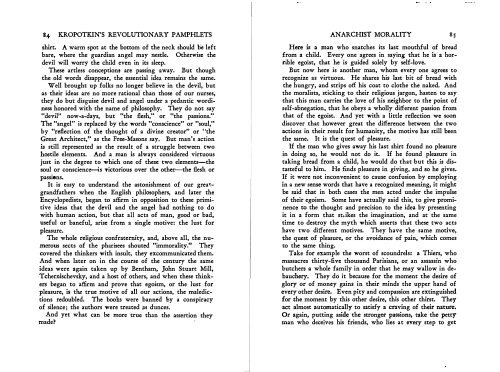Kropotkin's Revolutionary Pamphlets - Libcom
Kropotkin's Revolutionary Pamphlets - Libcom
Kropotkin's Revolutionary Pamphlets - Libcom
Create successful ePaper yourself
Turn your PDF publications into a flip-book with our unique Google optimized e-Paper software.
84 KROPOTKIN'S REVOLUTIONARY PAMPHLETS<br />
shirt. A warm spot at the bottom of the neck should he left<br />
bare, where the guardian angel may nestle. Otherwise the<br />
devil will worry the child even in its sleep.<br />
These artless conception8 are passing away. But though<br />
the old words disappear, the essential idea remains the same.<br />
Well brought up folks no longer believe in the devil, but<br />
as their ideas are no more rational than those of our nurses,<br />
they do but disguise devil and angel under a pedantic wordiness<br />
honored with the name of philosophy. They do not say<br />
"devil" now-a-days, but "the flesh," or "the passions."<br />
The "angel" is replaced by the words "conscience" or "soul,"<br />
by "reflection of the thought of a divine creator" or "the<br />
Great Architect," as the Free-Masons say. But man's action<br />
is still represented as the result of a struggle between two<br />
hostile elements. And a man is always considered virtuous<br />
just in the degree to which one of these two elements-the<br />
soul or conscience--is Tictorious over the other-the flesh or<br />
passiens.<br />
It is easy to understand the astonishment of our grea1:<br />
grandfathers when the English philosophers, and later the<br />
Encyclopedists, began to affirm in opposition to these primitive<br />
ideas that the devil and the angel had nothing to do<br />
with human action, but that all acts of man, good or bad,<br />
useful or baneful, arise from a single motive: the lust for<br />
pleasure.<br />
The whole religious confraternity, and, above all, the numerous<br />
sects of the pharisees shouted "immorality." They<br />
covered the thinkers with insult, they excommunicated them.<br />
And when later on in the course of the century the same<br />
ideas were again taken up by Bentham, John Stuart Mill,<br />
Tchernischevsky, and a host of others, and when these thinkers<br />
began to affirm and prove that egoism, or the lust for<br />
pleasure, is the true motive of all our actions, the maledictions<br />
redoubled. The books were banned by a conspiracy<br />
of silence; the authors were treated as dunces.<br />
And yet what can be more true than the assertion they<br />
made?<br />
ANARCHIST MORALITY<br />
Here is a man who snatches its last mouthful of bread<br />
from a child. Every one agrees in sayin that he is· a horrible<br />
egoist, that he is guided solely by selflove.<br />
But now here is another man, whom every one agrees to<br />
recognize as virtuous. He shares his last bit of bread with<br />
the hungry, and strips off his coat to clothe the naked. And<br />
the moralists, sticking to their religious jargon, hasten to say<br />
that this man carries the love of his neighbor to the point of<br />
sel£abnegation, that he obeys a wholly different passion from<br />
that of the egoist. And yet with a little reflection we soon<br />
discover that however great the difference between the two<br />
actions in their result for humanity, the motive has still been<br />
the same. It is the quest of pleasure.<br />
If the man who gives away his last shirt found no pleasure<br />
in doing so, he would not do it. If he found pleasure in<br />
taking bread from a child, he would do that but this is distasteful<br />
to him. He finds pleasure in giving, and so he gives.<br />
If it were not inconvenient to cause confusion by employing<br />
in a new sense words that have a recognized meaning, it might<br />
be said that in both cases the men acted under the impulse<br />
of their egoism. Some have actually said this, to give prominence<br />
to the thought and precision to the idea by presenting<br />
it in a form that st.ikes the imagination, and at the same<br />
time to destroy the myth which asserts that these two acts<br />
have two different motives. They have the same motive,<br />
the quest of pleasure, or the avoidance of pain, which comes<br />
to the same thing.<br />
Take for example the worst of scoundrels: a Thiers, who<br />
massacres thirty£ve thousand Paiisians, or an assassin who<br />
butchers a whole family in order that he may wallow in debauchery.<br />
They do it because for the moment the desire of<br />
glory or of money gains in their minds the upper hand of<br />
every other desire. Even pity and compassion are extinguished<br />
for the moment by this other desire, this other thirst. They<br />
act almost automatically to satisfy a craving of their nature.<br />
Or again, putting aside the stronger passions, take the petty<br />
man who deceives his friends, who lies at every step to get

















